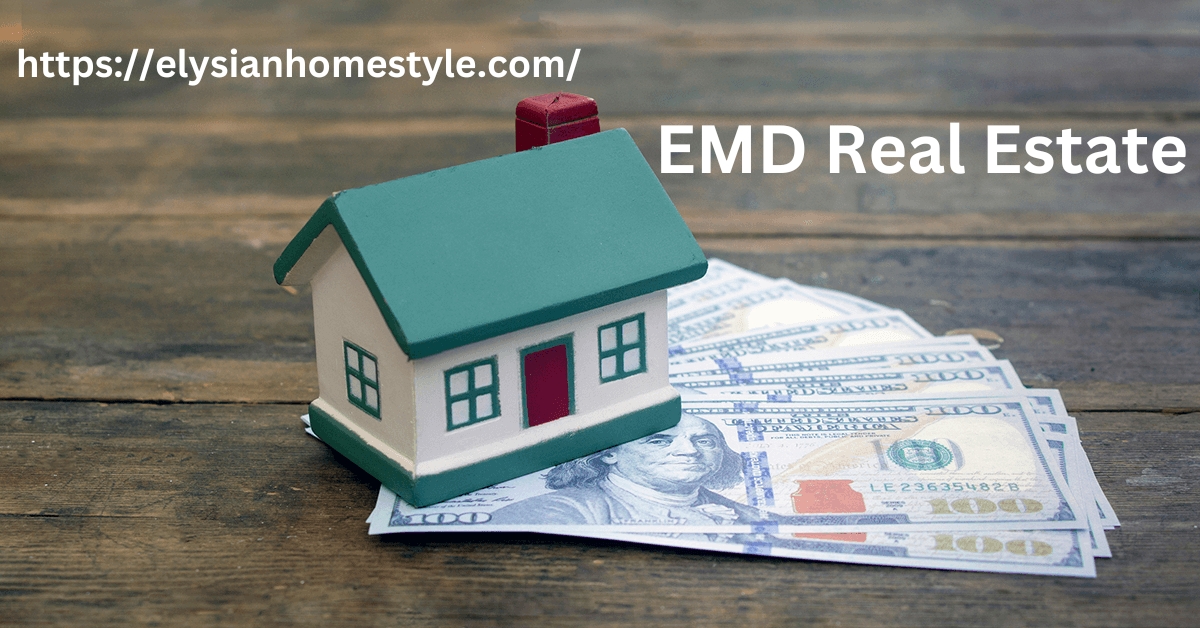When navigating the complex world of real estate, one term you are bound to encounter is EMD Real Estate. Short for “earnest Money deposit,” this is a critical component in real estate transactions that can determine the outcome of a deal. In this article, we’ll explore the ins and outs of EMD real estate, breaking down its significance, how it works, and why it matters for buyers and sellers. Whether you’re a first-time homebuyer or a seasoned investor, understanding EMD real estate will give you an edge in navigating this critical aspect of the property market.
What is EMD Real Estate?
EMD stands for earnest Money deposit, a buyer’s financial commitment to demonstrate serious intent when purchasing a property. In real estate transactions, the seller often receives multiple offers. The EMD serves as a form of assurance to the seller that the buyer is committed to closing the deal.
This deposit is typically held in an escrow account until the transaction is finalized. If the deal is successful, the EMD is applied toward the buyer’s down payment or closing costs. However, if the transaction fails, the fate of the EMD depends on the terms outlined in the purchase agreement.
Earnest Money deposits play a crucial role in EMD real estate by providing sellers peace of mind and ensuring buyers remain accountable. Without this deposit, sellers might hesitate to remove their property from the market or proceed with a buyer who could back out without penalty.
Why is EMD Important in Real Estate Transactions?
In the fast-paced world of real estate, trust and commitment are essential. This is where EMD real estate comes into play. The earnest Money deposit provides several benefits for both buyers and sellers:
- For Buyers:
- Demonstrates sincerity and commitment to purchasing the property.
- It helps strengthen their offer in competitive markets, where multiple bids may be submitted.
- This may allow for additional negotiation leverage with the seller.
- For Sellers:
- Offers financial protection if a buyer backs out for reasons not covered by the contract contingencies.
- Signals the buyer’s financial stability and seriousness in completing the transaction.
For these reasons, EMD real estate is a vital aspect of property deals, ensuring both parties remain engaged and secure throughout the process.
How Much is an EMD Real Estate?
The amount of an EMD varies depending on several factors, such as the market, the property’s price, and the level of competition among buyers. Generally, the earnest Money deposit ranges from 1% to 3% of the home’s purchase price. In highly competitive real estate markets, buyers may offer a larger EMD to stand out from other offers.
For example, if you purchase a $300,000 property, the EMD could be between $3,000 and $9,000. It’s important to note that the exact amount is typically negotiated between the buyer and seller, with guidance from their respective agents.
Buyers should ensure they have sufficient funds for the EMD when making an offer. Failing to provide an appropriate earnest Money deposit could result in their offer being declined.
Who Holds the EMD in a Real Estate Transaction?
In EMD real estate, the deposit is usually held in an escrow account by a neutral third party. This could be a real estate brokerage, escrow, or title company. Holding the deposit in escrow ensures that the funds are safeguarded until the transaction is complete or the purchase agreement terms are met.
The escrow holder is responsible for:
- Managing the EMD funds impartially.
- Disbursing the Money according to the terms of the purchase agreement.
- Resolving disputes if there is a disagreement between the buyer and seller over the deposit.
Having the EMD held in escrow gives both parties the confidence that the funds will be handled fairly.
What Happens to the EMD if the Deal Falls Through?
One of the most common questions in EMD real estate is what happens to the earnest Money deposit if the deal doesn’t close. The answer depends on the circumstances under which the deal fell apart:
- If the Buyer Cancels Due to a Contingency:
Many purchase agreements include contingencies that allow the buyer to back out of the deal without forfeiting their EMD. Common contingencies include:
- Financing contingency: The buyer is unable to secure a mortgage loan.
- Inspection contingency: The home inspection reveals significant issues that the seller refuses to address.
- Appraisal contingency: The property’s appraised value is lower than the agreed purchase price. If the buyer cancels the deal within the terms of a contingency, they are typically entitled to a full refund of their EMD.
- If the Buyer Cancels Without Just Cause:
If the buyer backs out for reasons not covered by a contingency, the seller may be entitled to keep the EMD as compensation for the time and effort lost. - If the Seller Cancels the Deal:
In rare cases where the seller terminates the agreement without valid cause, the buyer is usually entitled to a full refund of their earnest Money deposit. - Disputes Over EMD:
In cases of disagreement over who is entitled to the EMD, the funds may remain in escrow until both parties reach a resolution or the issue is resolved through mediation or legal proceedings.
How to Protect Your EMD in Real Estate Transactions
Losing your EMD can be a costly mistake, but there are steps you can take to protect yourself:
- Work with a Knowledgeable Agent:
An experienced real estate agent will help you navigate the contract and ensure appropriate contingencies are in place to safeguard your deposit. - Understand the Contract Terms:
Read the purchase agreement carefully and understand the conditions under which you might forfeit your EMD. - Stick to Contingency Deadlines:
Missing a deadline for a contingency (e.g., failing to conduct a home inspection within the agreed timeframe) could put your EMD at risk. - Keep Communication Open:
Maintain clear and timely communication with the seller and your agent to address potential issues.
Taking these precautions can minimize the risk of losing your EMD and ensure a smoother transaction.
The Role of EMD in Competitive Real Estate Markets
EMD real estate strategies can make or break a buyer’s offer in highly competitive markets. When sellers receive multiple bids, they often evaluate offers based on more than just the purchase price. A larger EMD can set your offer apart, demonstrating your financial capability and commitment.
However, buyers must balance offering an attractive EMD and protecting their finances. While a higher deposit might make your offer more appealing, you should only provide an amount you’re comfortable potentially losing in the event of a dispute.
EMD Real Estate: Key Takeaways
- The earnest Money deposit (EMD) is a financial commitment that shows a buyer’s seriousness in purchasing a property.
- EMD amounts typically range from 1% to 3% of the property’s purchase price.
- The deposit is held in escrow and applied to the down payment or closing costs upon successful transaction completion.
- If the deal fails, the fate of the EMD depends on the terms of the purchase agreement and contingencies.
Conclusion
Understanding the role of EMD real estate is essential for both buyers and sellers. This deposit ensures accountability and fosters trust in the transaction process. Buyers can strengthen their offers by carefully negotiating and managing the earnest Money deposit, and sellers can secure peace of mind during the sale process.
For anyone navigating EMD real estate, the key to success lies in preparation, communication, and a thorough understanding of contract terms. With the right approach, this critical aspect of real estate transactions can help both parties achieve their goals and close the deal confidently.

